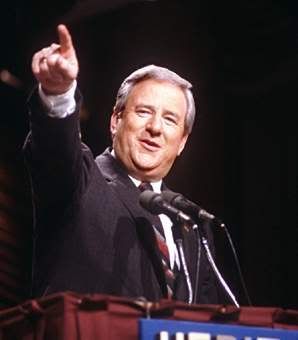Falwell And The Pornographer
 "We became friends."
"We became friends."Thus concludes a fascinating op/ed in today's LATimes by one of my least favorite people, Larry Flint, about his friend ... Jerry Falwell.
Their relationship went back to the 1970s, with Flint, as he puts it, "pushing the envelope of taste," and Falwell using Flint and Hustler as examples of all that is morally wrong, deeply morally wrong, with society. Falwell's attacks got under Flint's skin, and ...
I decided it was time to start poking some fun at him. So we ran a parody ad in Hustler — a takeoff on the then-current Campari ads in which people were interviewed describing "their first time." In the ads, it ultimately became clear that the interviewees were describing their first time sipping Campari. But not in our parody. We had Falwell describing his "first time" as having been with his mother, "drunk off our God-fearing asses," in an outhouse. (Here's the ad; be forewarned.)Typical Flint. A normal pornographer might have done something similar, but it would have ended with Falwell and a cousin, or even a sister, but his mother? Flint had left the "envelope" of taste far behind; he was pushing the upper stratosphere of bad taste.
In 1983, Falwell sued Flint for $50 million over the ad and Flint lost every round until the Supreme Court, very rightly, found for Flint. A Falwell victory would have stifled political free speech and swamped the courts in lawsuits filed whenever someone's feelings were hurt.
In most cases, the story would have ended there, but Falwell was a remarkable man with a deep conviction that forgiveness is asked of us by God, that efforts should be made to save even the most lost of all ... and that a Falwell and Flint show would be good for the soul-saving business. Flint tells the story, picking up just after Falwell surprised him with a hug on the Larry King show:
Soon after that episode, I was in my office in Beverly Hills, and out of nowhere my secretary buzzes me, saying, "Jerry Falwell is here to see you." I was shocked, but I said, "Send him in." We talked for two hours, with the latest issues of Hustler neatly stacked on my desk in front of him. He suggested that we go around the country debating, and I agreed. We went to colleges, debating moral issues and 1st Amendment issues — what's "proper," what's not and why.The self-righteous Left behaved far worse than the pornographer in responding to Falwell's death. Their minds and hearts were closed; they wouldn't have let Falwell in had he come buzzing at their office door. They couldn't risk the face-to-face and the dogma-wrestling that might follow.
In the years that followed and up until his death, he'd come to see me every time he was in California. We'd have interesting philosophical conversations. We'd exchange personal Christmas cards. He'd show me pictures of his grandchildren. I was with him in Florida once when he complained about his health and his weight, so I suggested that he go on a diet that had worked for me. I faxed a copy to his wife when I got back home. ..
We steered our conversations away from politics, but religion was within bounds. He wanted to save me and was determined to get me out of "the business."
My mother always told me that no matter how repugnant you find a person, when you meet them face to face you will always find something about them to like. The more I got to know Falwell, the more I began to see that his public portrayals were caricatures of himself. There was a dichotomy between the real Falwell and the one he showed the public.
He was definitely selling brimstone religion and would do anything to add another member to his mailing list. But in the end, I knew what he was selling, and he knew what I was selling, and we found a way to communicate.
Flint's story portrays the Falwell I've come to know since his death, thanks to the lengthy interviews Hugh aired with the man's close friends. He couldn't let Flint go to hell without a fight for his soul, so he -- not the pornographer -- humbled himself and made the first contact.
Had Falwell opened one of the magazines stacked on Flint's desk, Flint would have told us. But it appears Falwell was not interested in Flint's porn; apparently all that interested him was Flint's soul, and his mind.
Labels: America, Christianity, Pornography




<< Home